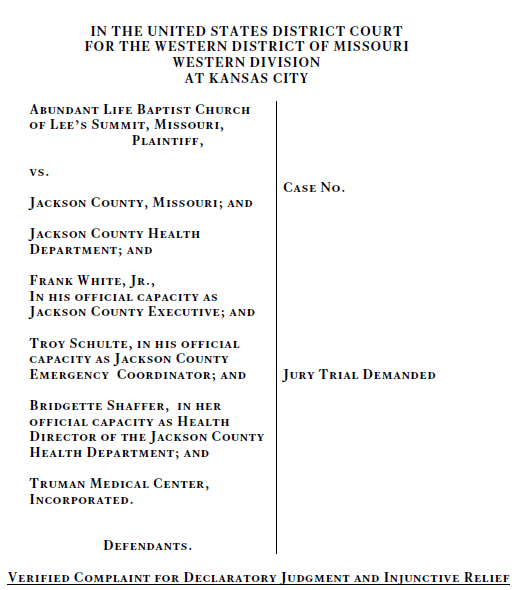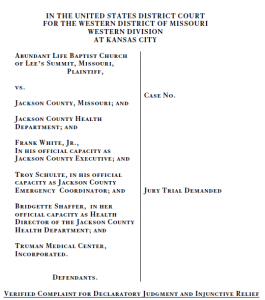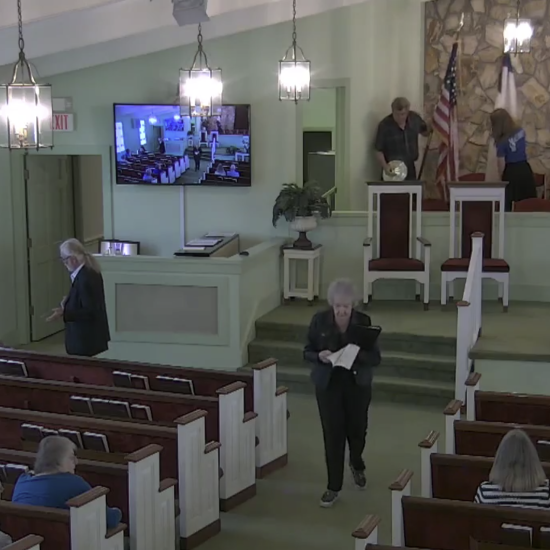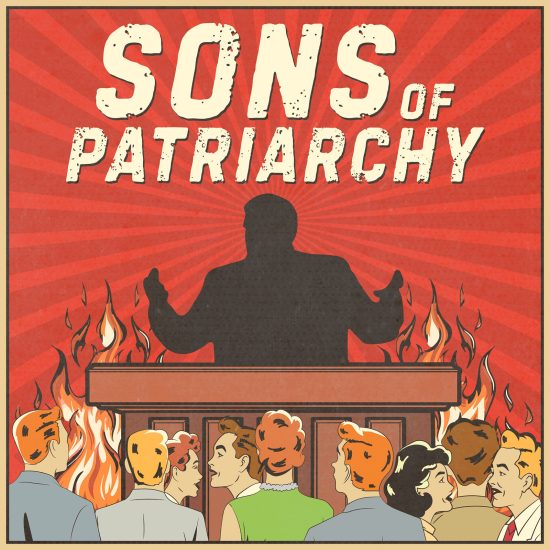
A Southern Baptist congregation in Lee’s Summit, Missouri, sued county officials Thursday (May 7) for restrictions on church services amid the ongoing coronavirus pandemic. The lead attorney in the case, a member of the congregation, also serves as legal counsel for the Missouri Baptist Convention. The suit joins dozens across the country, many by Baptist congregations, that have seen differing results from judges.
As of May 10, more than 4.1 million people globally have been infected with the COVID-19 respiratory disease caused by coronavirus, and more than 283,000 have died. In the U.S., the nation with the most infections and deaths, more than 1.3 million people have tested positive and 80,000 have died.
 The lawsuit filed by Abundant Life Baptist Church names Jackson County, the county’s health department, three county officials, and the Truman Medical Center that operates the health department. Jonathan Whitehead, the plaintiff’s lead attorney, serves as one of the MBC’s attorneys along with his father, Michael.
The lawsuit filed by Abundant Life Baptist Church names Jackson County, the county’s health department, three county officials, and the Truman Medical Center that operates the health department. Jonathan Whitehead, the plaintiff’s lead attorney, serves as one of the MBC’s attorneys along with his father, Michael.
Abundant Life joined another Southern Baptist congregation, Fellowship Church in Greenwood, in writing a letter to Jackson County officials urging a change in its restrictions on gatherings like church services. When county leaders didn’t change the policy, Abundant Life filed suit. Michael Whitehead is a member at Fellowship.
The case by Abundant Life claims county officials are engaged in “unconstitutional and unlawful discrimination against religious institutions and person” with coronavirus restrictions impacting church services. The complaint particularly criticizes Jackson County’s new rules that start May 11 and will limit religious gatherings still to 10 people while allowing some businesses to go beyond that with up to 10 or 25 percent of the fire code occupancy depending on the size of the building.
The lawsuit claims these rules “single out religious activity for less favorable treatment than other, similarly situated non-religious activities.” However, religious groups aren’t singled out but instead are treated like other large gatherings instead of like a restaurant or retail stores. And the new rules give more freedom to religious gatherings than some other categories, such as gyms and fitness centers, schools, outdoor sports courts and playgrounds, and entertainment venues — all of which remain closed.
“Defendants’ orders impermissibly discriminate against religiously-motivated gatherings, and in favor of commercially-motivated gatherings,” the suit claims. “Defendants’ order, policies and practices have imposed a substantial burden on Abundant Life’s sincere religious exercise.”
The lawsuit claims the larger of Abundant Life’s two worship sites has “an approved occupancy load of 4,740 persons.” Thus, if treated like a restaurant or retail store, the suit adds, the church could “admit 474 persons.” The lawsuit doesn’t note if the approved occupancy is for the entire building or just for the sanctuary.
And while the lawsuit implies the church would follow the 10 percent occupancy limit, the suit also claims their “religious exercise has been burdened” since they’ve “been forced to cancel or turn away persons from corporate worship services of the Almighty God.” Since, as the suit notes, their services before the pandemic brought in 4,500 people over three services, allowing only 474 per service could still force them to “turn away persons” from worship.
Although the suit claims the new order would cause them to face punishment or “violate their religious beliefs by failing to assemble for corporate worship on the Lord’s Day and at other time,” the suit also notes the church complied with earlier orders by “canceling its five weekly corporate worship services” since the start of the outbreak. The lawsuit doesn’t challenge the order that runs until May 11 and therefore prevents worship again on May 10.
Claiming Jackson County officials have no “compelling government interest” to restrict large gatherings like churches, Abundant Life and its supporters insist the coronavirus restrictions are not legitimate. For instance, Michael Whitehead claimed in an interview supporting the suit filed by Jonathan, “Worship is not an inherently more dangerous activity than shopping at Walmart.”
However, church services across the country have sparked dozens of virus hotspots, including in Arkansas, California, Georgia, Illinois, Kansas, Kentucky, and Washington — as well as in several other countries. And there are growing concerns about the potential of church services to spread the coronavirus through practices like singing that can even render recommended social distancing practices insufficient.
A new poll found that 48% of Americans say church services shouldn’t be allowed right now because of the potential of spreading coronavirus, while 42% believe they should be allowed with restrictions, and just 9% think they should be allowed without restrictions.
Similar lawsuits across the country challenging mass gathering bans impacting in-person religious services have mostly failed to find support from judges. Courts have denied challenges by religious plaintiffs in California, Illinois, Kentucky, New Hampshire, and Virginia, while judges in Kansas and a second case in Kentucky granted temporary injunctions to block orders limiting the size of church services. Several of those cases have involved Baptists as plaintiffs, including in Kansas, Kentucky, and New Hampshire.






